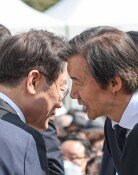U.S.-China dialogue for Korean reunification fast catches on
U.S.-China dialogue for Korean reunification fast catches on
Posted May. 02, 2013 06:46,
With North Koreas Kim Jong Un regime showing no signs of fundamental change, suggestions have been made in earnest for the need to boost cooperation between the U.S. and China to prepare for reunification of the Korean Peninsula and sudden change of situation in the North.
At an international conference hosted by the Asan Institute of Policy Studies on Tuesday, Kurt Campbell, former U.S. assistant secretary of state for East Asian and Pacific affairs who is visiting Korea, said South Korea and the U.S. should discuss with China about unexpected situations (in North Korea). Campbell effectively suggests that while South Korea and the U.S. have constantly discussing the issues of preparation for sudden shift of situation in the North and reunification of the Korean Peninsula, they should involve China in this discussion.
An informed diplomatic source in Seoul said Tuesday, Some members of the Chinese academic community and government have started paying attention to how reunification of the Korean Peninsula will benefit China, judging that North Koreas provocations damage (Chinas) national interests.
May will likely be the watershed for shift of situation on the Korean Peninsula. A South Korean government source said, Far-reaching efforts will likely be made to bring North Korea to dialogue in May. If Pyongyang does not respond till the last minute, the argument to fundamentally change the rule of game that can resolve the North Korea issue could gain further momentum.
Insiders and outsiders of the South Korean government forecast that the Korean Peninsula could embrace a phase of dialogue, as the Norths continued threats since its third nuclear test on February 12 have waned, and South Korea-U.S. joint military drills were concluded on Tuesday. As such, analysts predict that diplomatic collaborations and reshuffles between South Korea and its surrounding countries, such as the U.S., China, Japan and Russia, to bring the North to the negotiating table, will likely be conducted in earnest.
China reportedly is persuading North Korea to halt provocations and come to negotiations through various diplomatic channels, including the North Korean embassy in Beijing and the Chinese embassy in Pyongyang. There is a growing chance that Beijing will dispatch a ranking official such as Wang Jiarui, head of the International Liaison Department of the Communist Party of China Central Committee, or Wu Daiwei, Chinas chief negotiator for the six-party talks, to North Korea as a special envoy.
President Park Geun-hye will reportedly visit China and hold summit talks with Chinese President Xi Jinping in around June, after holding South Korea-U.S. summit in Washington next Tuesday.
Kim Seong-han, second vice minister of the Foreign Affairs Ministry, said, The month of May will embrace a phase where countries surrounding the Korean Peninsula will attempt to make a game change, which they will shift the game of unilateral aggressions and threat by the North to the game of dialogue.
zeitung@donga.com







